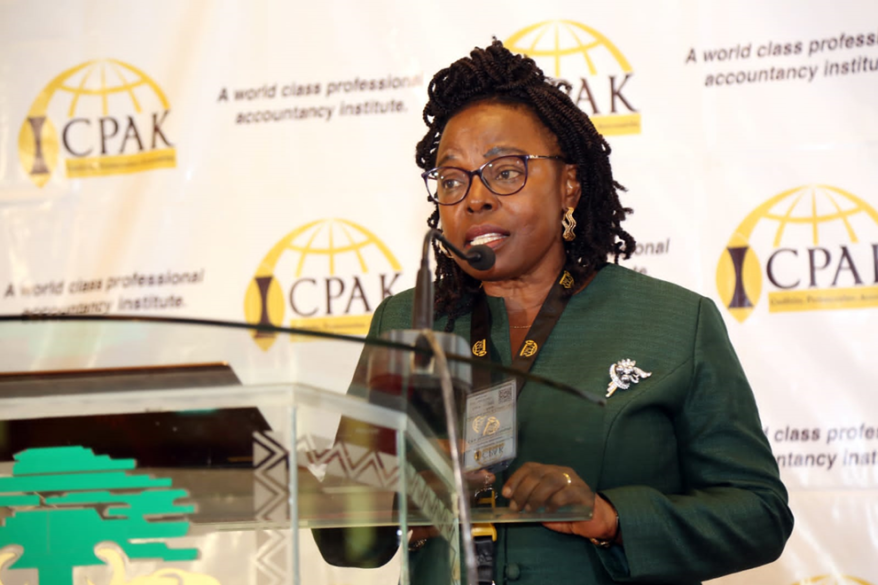The Controller of Budget, Dr Margaret Nyakang’o graced the 30th Annual Economic symposium hosted by Institute of Certified Public Accountant of Kenya (ICPAK) at Safari Park on 11th February 2022. The theme of the symposium was ‘Managing Transition: Closing in on accountability gaps.’In her opening statement she noted that transition is not an event but a trend-setting process whose success is critical in terms of shaping public attitudes and perceptions about the new county administration. She elaborated that governors should expect to take charge in leading the transition process where she quoted Article 10(2) C of the Constitution which states that accountability is one of the national values and principles in managing the transition to the new county administration.
She highlighted the main roles of the OCOB, the main one being the oversight role; which entails overseeing implementation of the budgets of both national and county governments. She also elaborated on strategic tools on managing transition that included approved budgets, which is an important policy document of governments and other institutions, where policy objectives are translated into activities and implemented in concrete terms.
“Incoming governors should therefore look at the budget strategically as an important tool for achieving key objectives within the county government.” She said. She continued to say that the approved budget will also act as a reference tool whereby activities to be implemented in that year are contained. The budget will act as a management tool whereby the budget will be used to set departmental annual performance targets. Budget as a legislative tool whereby, the governor should therefore consult with the legislature to develop a budget that will serve the interest of the public.
Dr. Nyakang’o highlighted the county fiscal strategy paper which provides revenue estimates or projections to finance the proposed budget, and outlines the expenditure items and any mechanism to address budget deficit. She zeroed in on key areas in managing accountability gaps which are unfunded mandates, where a new governor must be informed. On the same breath, she brought about verification and settlement of pending bills, whereby the pending bills have risen rapidly, and as of June 2021, counties reported accumulated pending bills amounting to Ksh. 96 billion. OCOB has put measures in place to ensure that pending bills are adequately budgeted for and prioritized during exchequer requisitions.
She raised concerns on the County Budget & Economic Forums which provide for the establishment of County Budget and Economic Forums as a means for consultation on planning, budgeting and financial management at the county level. She also touched on the internal audit departments and committees whereby the counties have not established effective Internal Audit Departments. On Project Monitoring Units she stated that, “the lack of effective PMUs have resulted to: poor workmanship; low absorption of development funds; and unnecessary delays in completion of projects.” Under the Public Participation Framework, she advised that Counties should develop a comprehensive framework for public participation to enable citizen participation in governance matters.
She further highlighted that a number of Counties are yet to establish effective revenue collection frameworks and mechanisms to seal loopholes that lead to revenue leakages. High wage bill has been attributed to staff inherited from the defunct local authorities & National Government, lack of standardized assets, liabilities register which impedes the consolidation of the information into registers of Assets and Liabilities and lack of documents of ownership for assets which has been highlighted in audit reports over the years, especially with respect to land.
She added that, entities do not have proof of ownership for their land, and motor vehicles where some lack even logbooks. Under risk management, general lack of identification, documentation and allocation of risks associated with assets and liabilities in the public sector and the use of different basis of accounting whereby significant assets and liabilities are not reflected in Public Sector financial statements and use of cash basis limits the country’s capacity in public assets reporting, control and management.
Dr Nyakang’o concluded that budgets play several roles including management and legislation therefore, the new administration will be better placed to exploit the two roles to advance their agenda through the budget. Finally, new Governors should avoid blaming the shortcoming of the budget on the previous governor.

Dr. Nyakang’o poses with the Auditor General Ms. Nancy Gathungu and the ICPAK council members




NO COMMENT
LEAVE A REPLY